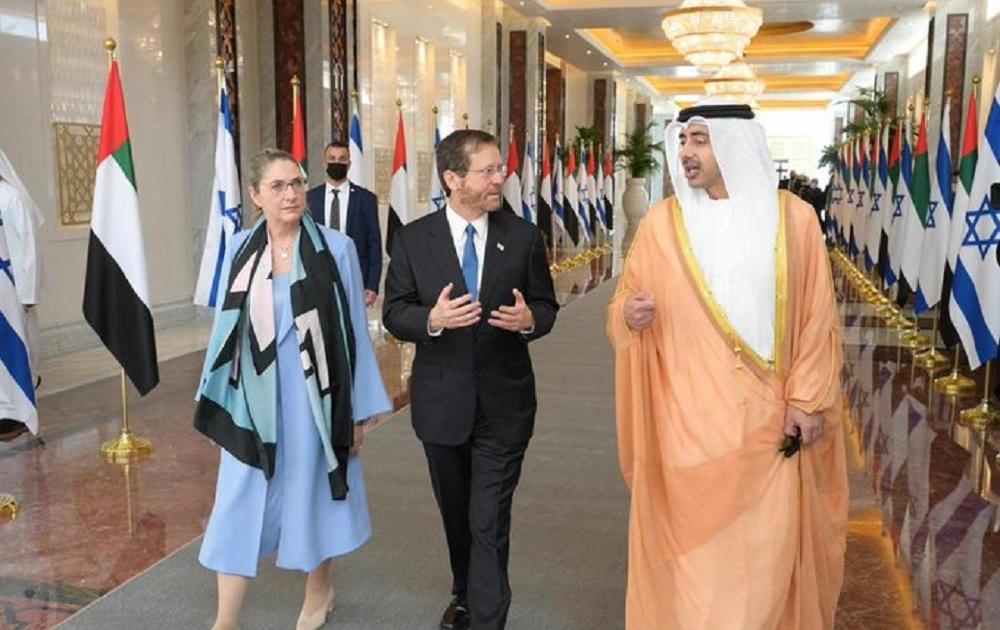Watan - In the wake of the recent missile and drone attacks launched by the Yemeni Houthi group on Abu Dhabi, the rulers of the Emirates turned to Israel for military assistance.
Houthi's threat to the UAE
The latest drone attack took place during the visit of the Israeli occupation president, Isaac Herzog, last week.
According to a report by the British "Middle East Eye" website, translated by (Watan), this was not the first Houthi threat to Israel. The Houthis, allied with Iran, have threatened in the past to fire missiles at the coastal city of Eilat, located in southern Israel, about 1,500 km from Yemen.
In response, two years ago, Israel raised the state of alert in the Eilat region and sometimes deployed Iron Dome batteries there based on intelligence warnings.
At the same time, Mossad and military intelligence intensified their surveillance of Yemen and collected information there.
Recently, a high-ranking Israeli delegation consisting of Defense Ministry officials, Mossad operatives, and executives of Israeli arms manufacturers visited the UAE.
Emirati officials are particularly interested in Israeli-made air defenses such as Iron Dome, David's Sling and Arrow, in addition to their radar systems.
So far, all the Emirati and Saudi anti-missile systems are US-made, like the Patriot batteries.
Dilemma.. Selling Israeli systems to the UAE is a serious matter
For their part, Israeli sources told Middle East Eye that they are studying the Emirati request, but they also considered it a serious matter that must be dealt with with caution.
Israel will have to balance its desire to sell arms around the world - it was officially announced this week that it has granted military export licenses to 139 countries. and the need to protect their sensitive homemade equipment.
The Israeli dilemma is how to maintain its technological edge while selling systems to strategic partners.
So far, Israel has sold partial Iron Dome components, such as radars and ground control systems, to Singapore and Azerbaijan. But it did not sell interceptors made by the state-owned Rafael Corporation.
Washington purchased two Iron Dome systems to evaluate their effectiveness.
 Another obstacle to the export of Israeli weapons to the Gulf
Another obstacle to the export of Israeli weapons to the Gulf
However, there is also another obstacle in the way of Israel handing over air defenses to the Gulf, and it is an obstacle that is perhaps stronger, and that is the “United States.”
The United States views the region as a vital area that represents a priority for it, and it also has a military presence and bases in Qatar, Bahrain and the Emirates.
Washington sells these countries weapons of all kinds, from F-35 fighter jets, drones and intelligence technology, to naval equipment and anti-aircraft batteries.
US military and security firms do not want to see Israeli competition enter what they see as their own backyard.
It is noteworthy that for years the Mossad facilitated secret relations between Israel and the Emirates, Bahrain and Saudi Arabia. This led to close cooperation in sharing intelligence against Iran, as well as the sale of intelligence equipment such as the infamous Pegasus spyware.
Israeli companies such as Logic, owned by Matti Kochavi, have operated secretly for years in the UAE.
Kochavi also hired former Mossad and Shin Bet officials, as well as former experts from Israel Aerospace Industries.
After Kochavi fell out of favor with the ruling Al Nahyan family in Abu Dhabi, he was replaced by David Meidan, a former Mossad agent, as a mediator between Israel and the Emirates.
The report added that all these secret deals and communications were approved and encouraged by the Israeli Ministry of Defense.
Since open normalization began with the signing of the so-called Abraham Accords in 2020, Israel was able to open full diplomatic and commercial relations with the UAE, Bahrain and Morocco later. As well as strengthening its intelligence relations.
Cooperation no longer needs to be kept secret
Last week, Israeli Defense Minister Benny Gantz visited Bahrain, met with its rulers, and signed with his counterpart a memorandum of understanding for security cooperation - the first to be agreed upon with an Arab country .
Only the special relations between Israel and Saudi Arabia are kept secret.
Despite the encouragement and pressure from Donald Trump and his administration, Riyadh refused to indulge in public normalization in the footsteps of the UAE and Bahrain.
Israeli security and diplomatic sources told Middle East Eye that they have high expectations that once Crown Prince Mohammed bin Salman sits on the throne, after the death of his old and ailing father, King Salman, the kingdom will most likely make open relations with Israel.
In the meantime, Saudi Arabia and other Gulf states will continue and even accelerate their security cooperation with Israel and purchase more weapons.
(Source: Middle East Eye)
Read also:
